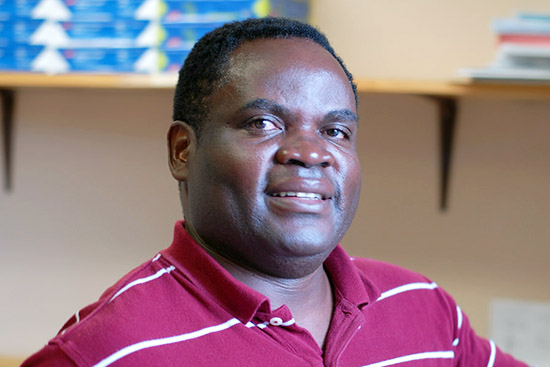On 20 March 2016, a dozen of armed men wearing uniforms of the army of the Democratic Republic of Congo, disrupted a peacemaking retreat in the social center called “My beautiful village” in Vitungwe-Isale, Beni district of the North Kivu region. These men murdered Father Vincent Machozi, an Assumptionist Catholic priest who led the fight against the extractive industries and in support of human rights in the Democratic Republic of Congo. According to reports, onlookers said Vincent’s last words were: “Why are you killing me?”.
Born in 1965 in a family of seven children, orphan from his father aged 15, Vincent decided to study theology and to join the Assumptionist congregation. After studying theology in Angers, France, he became a priest in 1994, and was sent to Kinshasa, DRC, to teach religion. Afterwards, he was the head professor in Butembo, an area where Assumptionists are heavily implanted, and had then left the country to the United States after several death threats. He worked in Boston, Massachusetts, and launched the first French-speaking news portal on Eastern DRC called Beni Lubero (www.benilubero.com), a online platform documenting human rights abuses in the Democratic Republic of Congo, especially against Vincent’s Nande people.
At the tenth anniversary of the website’s launch, Vincent was saying that “for the past ten years, we have been the memory and the thermometer of this province”, noting that Beni Lubero informed the population “on 1,155 martyr cases all around the DRC” and denounced “the current manoeuvers of the Rwandan occupation of the Kivu region and the balkanization going on in the country”.
On top of being priest and editor of Beni Lubero, Vincent Machozi was the chairperson of the organization Kyaghanda Yira, named after the main ethnicity in that part of the North Kivu region. This organization fights for the rights and land rights of the people. Since 2010, the Yira/Nande people are allegedly systematically chased and massacred by armed groups to exploit coltan resources. The organization called this massacre a “genocide of the Yira people”.
Over the years, Machozi has been involved in several protests against illegal trade of this mineral ore used in electronic devices. The so-called “war of coltan” in the mineral-rich eastern Congo, has left millions dead and more than a million women raped. Transnational corporations are able to exert extreme pressure on Congo’s weak government and economy. As a result, the country’s natural resources have become an important factor in increasing poverty and violence rather than wealth and development. According to his colleague from Boston University, Timothy Longman, “Vincent was trying to show the world who was killed and who was responsible. He wasn’t on any particular side.”
Vincent Machozi returned to the DRC in 2012, putting aside work on his PhD thesis exploring the role of the Catholic Church in transforming the conflict in his country in favor of human rights work. A few days before Vincent Machozi was killed, the priest posted an article implicating in the violence the DRC’s president from 2001, Joseph Kabila and Rwanda’s president since 2000, Paul Kagamé.
According to Rev. Emmanuel Kahindo, the Rome-based vicar general of the Assumptionist order and a fellow Congolese, Vincent Machozi knew the end was likely at hand, telling him in October 2015: “My days are numbered. I will be murdered, I feel it … but like Christ, for the sake of our people, I will not be silent. I will continue my fight to the end and continue to condemn all those who sow division and hatred between ethnic groups in the region to rule and continue to exploit the riches.”


